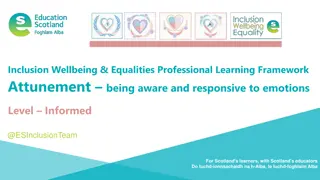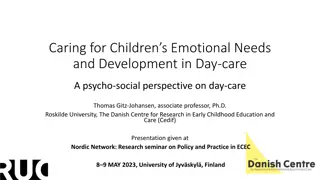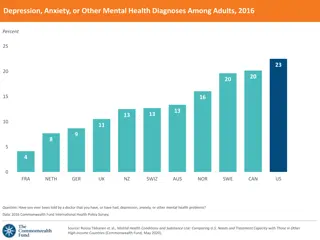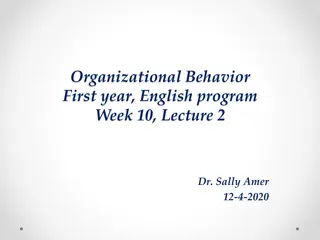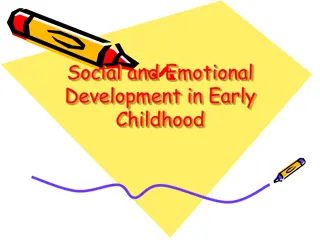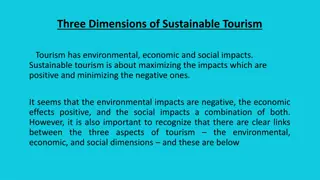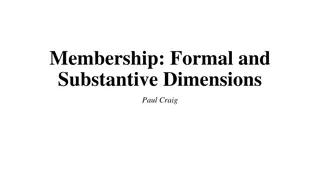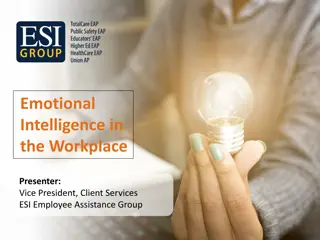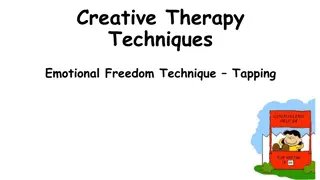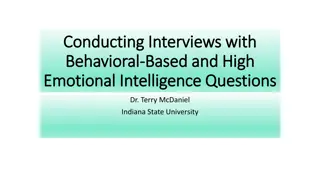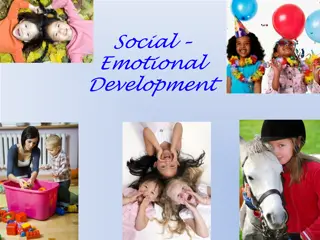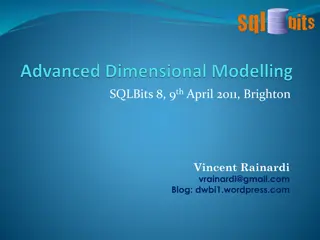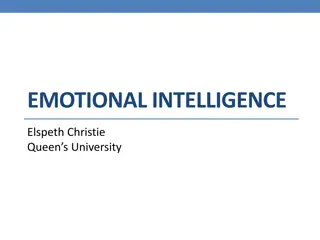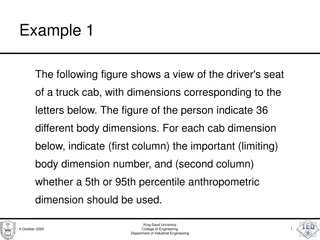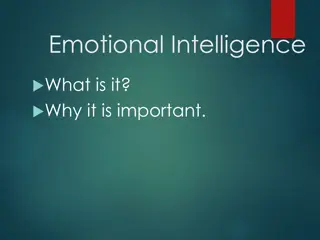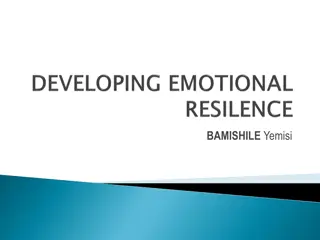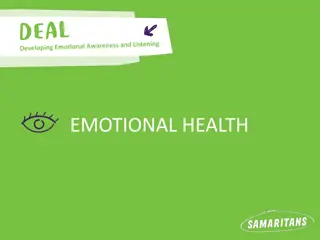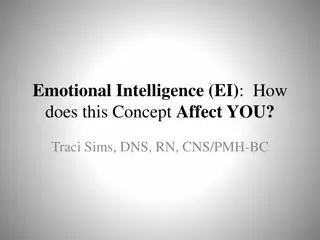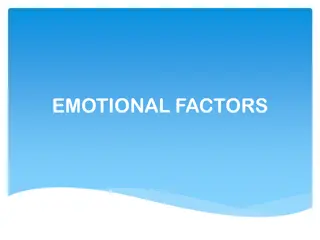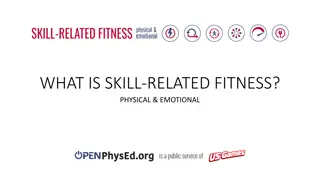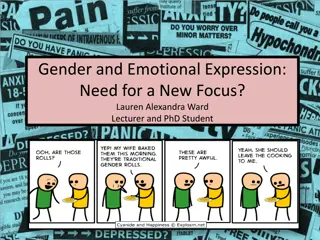Dimensions of Health and Well-being: A Holistic Approach
Understanding the various dimensions of health - physical, mental, social, emotional, spiritual, vocational, educational, and nutritional - is crucial for achieving overall well-being. Each dimension plays a unique role in contributing to a person's holistic health, encompassing aspects such as phys
0 views • 9 slides
Strategies for Improving Emotional Wellness and Health
Emotional wellness involves identifying, expressing, and managing a range of feelings. Strategies to enhance emotional health include staying positive, reducing stress, getting quality sleep, exercising, strengthening social connections, viewing mistakes as learning experiences, practicing mindfulne
1 views • 13 slides
Enhancing Emotional Attunement for Educators in Scotland
In this presentation, educators in Scotland are invited to explore the importance of emotional attunement in fostering trusting relationships with learners. The resource provides a framework for professional learning, including reflection on learners' perspectives on good teaching practices and stra
1 views • 25 slides
Professional Learning Resource for Emotional Regulation and Brain Function
Explore the Inclusion, Wellbeing, and Equalities Professional Learning Framework tailored for Scotland's educators and learners. Dive into the interconnectivity between emotional regulation, brain function, and trauma challenges. Utilize the resource to enhance knowledge, understanding, and support
3 views • 18 slides
Understanding Emotional Patterns in Families
Families play a crucial role in shaping individuals' emotional responses and behaviors. Caregivers influence how we perceive and manage emotions, impacting our emotional well-being. By examining how different emotions are accepted, rejected, and modeled within families, one can gain insights into th
10 views • 14 slides
Do's and Don'ts of Emotional Trauma Release Massage Sessions
Emotional trauma can weigh heavily on our minds and bodies, affecting our daily lives in profound ways. While seeking help through emotional massage therapy can be a step toward healing, it's crucial to understand the do's and don'ts of these sessions to ensure a safe and effective experience.
8 views • 5 slides
Understanding Children's Emotional Development in Daycare from a Psycho-Social Perspective
Scientific evidence emphasizes the early onset of emotional development and its profound impact on lifelong outcomes. The quality of childcare processes plays a pivotal role in shaping children's social-emotional development, highlighting the importance of nurturing emotional relationships in daycar
0 views • 10 slides
Mental Health Insights Among High-Income Countries Adults in 2016
Explore the prevalence of depression, anxiety, emotional distress, and socioeconomic needs among adults in high-income countries based on the 2016 Commonwealth Fund International Health Policy Survey. The data highlights the rates of mental health diagnoses, subjective experiences of emotional distr
1 views • 10 slides
Understanding Emotional Labor in Organizational Behavior
Emotional labor involves employees expressing organizationally desired emotions during work interactions, impacting job performance. Employees may face emotional dissonance when projecting one emotion while feeling another, leading to surface or deep acting. Affective Events Theory (AET) suggests th
0 views • 19 slides
Understanding Emotional Wellness for Inner Well-Being
Exploring the importance of emotional wellness in cultivating inner well-being, this content delves into the facets of social, mental, and emotional well-being. It emphasizes the significance of acknowledging and accepting our feelings, maintaining a positive outlook, and finding purpose and peace w
1 views • 27 slides
Early Childhood Social and Emotional Development Insights
Social and emotional development in early childhood is influenced by various factors such as family dynamics, parenting styles, peer interactions, and cultural backgrounds. Erikson's stages highlight the importance of initiatives and self-understanding in shaping emotional growth. Parents play a cru
2 views • 35 slides
Understanding the Three Dimensions of Sustainable Tourism
Sustainable tourism focuses on maximizing positive impacts while minimizing negative ones across environmental, economic, and social dimensions. The environmental dimension includes aspects like natural resources, landscapes, and wildlife. The economic dimension examines financial impacts, while the
0 views • 11 slides
Dimensions of Membership in the European Union
The formal and substantive dimensions of membership in the European Union are outlined, including the criteria for accession and withdrawal. Formal criteria involve unanimity, consent of the European Parliament, and ratification of agreements, while substantive requirements focus on a state's commit
0 views • 22 slides
Understanding Emotional Intelligence in the Workplace
Explore the significance of emotional intelligence in the workplace, its definition, five competencies, case studies, and strategies to enhance skills. Dive into scenarios, role-plays, misconceptions, and why emotional intelligence is crucial for professional success. Learn about managing emotions,
0 views • 33 slides
Understanding Emotional Intelligence: Key Principles and Skills
Emotional intelligence, as presented by David Taylor, is crucial in perceiving, understanding, and managing emotions in oneself and others. It plays a vital role in professional and personal relationships by enhancing emotional awareness, recognition, and management. The principles of emotional inte
2 views • 22 slides
Understanding the Impact of Cortisol on Emotional Expression in Young Children Facing Economic Hardship
This study explores how the stress hormone cortisol is related to emotional expression in young children experiencing economic hardship. Cortisol levels can indicate stress, but prolonged exposure to stress can lead to desensitization. The research focuses on children attending Head Start preschools
0 views • 15 slides
Understanding Emotional Abuse: Signs, Effects, and How to Respond
Explore the intricacies of emotional abuse through the eyes of Dr. Katia Reinert, Associate Director of GCHM. Delve into the techniques used by emotional abusers, self-assessment for identifying abuse, effects of abuse, and guidance on how the Christian community can help. Discover the challenges of
1 views • 31 slides
Understanding Emotional Freedom Technique (EFT) Tapping for Emotional Wellness
Emotional Freedom Technique (EFT) tapping, rooted in acupressure, offers a holistic approach to addressing stress, fear, and phobias. This body-centered therapy draws on ancient Chinese practices, stimulating specific acupoints to improve energy flow. Studies show effectiveness in treating depressio
0 views • 4 slides
Understanding the Three Dimensions of Health: Physical, Emotional, and Social
Explore the different facets of health through the Health Triangle model, which includes physical, emotional, and social well-being. Learn how each aspect contributes to overall wellness and discover elements of physical and mental/emotional health that are essential for a balanced lifestyle.
0 views • 26 slides
Enhancing Emotional Intelligence Through Behavioral Interview Questions
Explore the key aspects of emotional intelligence, including social-emotional competencies and cognitive, affective, and behavioral competencies. Learn how to conduct interviews focused on emotional intelligence and discover the importance of relationships, self-awareness, responsible decision-makin
0 views • 44 slides
Understanding Social and Emotional Development in Young Children
Explore the general emotional patterns and specific emotions in young children aged 4 to 6 years. Understand the positive and negative characteristics such as self-centeredness, independence, anxiety, and fear, and learn how to deal with common fears like imaginary dangers and separation anxiety. Re
1 views • 19 slides
Safeguarding Infants from Emotional Maltreatment: What Works?
Safeguarding infants from emotional maltreatment is crucial during the first two years of life. Emotional abuse, though not always accompanied by physical or sexual abuse, can have severe impacts on a child's development. The paper explores the structure, prevalence, and impact of emotional abuse on
3 views • 59 slides
Advanced Dimensional Modelling: Strategies for Effective Data Handling
Explore advanced techniques in dimensional modelling such as handling rapidly changing dimensions, snowflaking dimensions, and dealing with very large dimensions. Learn about different types of dimension structures, fact tables, and their combinations to optimize data storage and retrieval efficient
0 views • 44 slides
Exploring the Dimensions of Living
Embark on a journey to uncover the seven major dimensions of existence, delving into realms such as God's intelligence, human spirit, and channels of communication. Discover how these dimensions shape our understanding of life both before and after the fall of man, offering insights into the intrica
0 views • 39 slides
Understanding Emotional Intelligence and its Components
Emotional Intelligence is about identifying, understanding, and managing emotions, recognizing your own needs and those of others, and enhancing interpersonal skills. It involves self-perception, self-expression, and affects decision-making and stress management. People with high emotional intellige
0 views • 20 slides
Understanding Adolescent Development and Emotional Intelligence by Finbar Chambers
This collection presents insights on Gardner's Multiple Intelligences, Emotional Intelligence, and the importance of understanding adolescent development. Finbar Chambers explores emotional makeup, behavior management strategies, and the transition to independence during adolescence. Discover the im
0 views • 20 slides
Dimensions of Wellness for Virginia Tech Faculty
Virginia Tech provides resources in six Dimensions of Well-being - Physical, Social, Emotional, Financial, Community, and Purpose. Each dimension addresses different aspects of wellness to ensure a holistic approach to well-being. Resources range from exercise programs and social events to nutrition
0 views • 18 slides
Understanding Dimensions and Units in Describing Physical Properties
A moving object can be described in terms of various measurable properties such as mass, length, area, volume, velocity, acceleration, temperature, and more. These dimensions play a crucial role in dimensional reasoning and forming accurate physical equations. The SI system provides a rationalized s
0 views • 5 slides
Understanding Emotional Labour in Probation Practice
Explore the concept of emotional labour in probation practice, highlighting the management of emotions, impact on research and practice, links to burnout, and the role of managerialism and rationality. Delve into emotional work, Chamberlayne's 'emotion work', and feeling rules associated with emotio
0 views • 16 slides
Anthropometric Design Considerations for Truck Cab Driver's Seat
The provided figures and dimensions illustrate the importance of considering anthropometric data when designing truck cab driver's seats. Each dimension of the cab corresponds to a specific body dimension, highlighting the need to utilize either the 5th or 95th percentile anthropometric data for opt
0 views • 7 slides
Importance of Emotional Intelligence in Religious Leadership
Religious leaders benefit greatly from high emotional intelligence, leading to better performance, increased staff retention, and a more positive work environment. Emotional intelligence plays a vital role in pastoral ministry, enhancing emotional care for congregants. Educational programs focusing
0 views • 15 slides
Understanding Emotional Intelligence in the Workplace
Emotional intelligence plays a crucial role in professional success, impacting how we lead teams, handle pressure, and build relationships. This webinar explores the definition of emotional intelligence, its significance in the workplace, and practical ways to enhance it. Discover the key elements o
0 views • 14 slides
Understanding Emotional Intelligence: Definition, Importance, and Examples
Emotional intelligence, a term that originated in the 1960s, refers to the ability to recognize and manage emotions in oneself and others effectively. It involves identifying emotions, understanding their impact, and using this awareness to guide behavior. Emotional intelligence is crucial for perso
0 views • 35 slides
Enhancing Emotional Resilience: Key Strategies and Benefits
Exploring the concept of emotional resilience, this content covers the definition of emotions, emotional resilience, and the domains of resilience. It delves into the importance of emotional resilience, ways to improve it, and how it helps individuals bounce back from adversity, maintain balance, an
0 views • 17 slides
Exploring the Ups and Downs of Emotional Health Throughout the Day
Dive into a visual journey depicting the ebb and flow of emotional well-being in a day, from morning reflections to evening introspections. Experience different facets of emotional health through images, timelines, and audio clips, offering insights to nurture your mental and emotional well-being.
0 views • 7 slides
The Impact of Emotional Intelligence in Nursing Practice
Emotional intelligence plays a crucial role in nursing, influencing personal well-being, patient outcomes, and stress management. Nurses with higher emotional skills are better equipped to navigate the challenges of their profession. Understanding the history and significance of emotional intelligen
0 views • 23 slides
Performance Development: Emotional Factors and Strategies
Understanding emotional factors in performance development, collecting relevant information, utilizing positive self-talk for emotional development, and the importance of monitoring and evaluating performance for continual improvement and targeted training. Visual aids complement the explanation of
0 views • 4 slides
Social-Emotional Health and Resilience of Teachers in East European Countries
This study explores the social-emotional health and resilience of teachers in Latvia, Lithuania, and the Slovak Republic as part of an Erasmus+ project aimed at developing a digital support system to promote their well-being. The interplay between mental health, social-emotional health, and resilien
0 views • 30 slides
Understanding Skill-Related Fitness: Physical and Emotional Aspects
Skill-related fitness encompasses both physical and emotional components, such as agility, balance, coordination, power, reaction time, and speed. Physical agility involves quick body movements, while emotional agility relates to positive responses in various situations. Physical balance requires we
0 views • 7 slides
Gender and Emotional Expression: A New Perspective on Identity and Mental Health
Exploring the societal constructs of gender and their impact on emotional expression, this study delves into the Gender Roles Hypothesis, challenges traditional norms around emotional display, and examines the correlations between gender and mental health outcomes. The research sheds light on the ne
0 views • 15 slides


